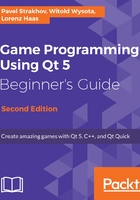
上QQ阅读APP看书,第一时间看更新
Qt Essentials
The Essentials group contains modules that are mandatory to implement for every supported platform. This implies that if you are implementing your system using modules from this group only, you can be sure that it can be easily ported to any other platform that Qt supports. The most important relations between Qt Essentials modules are shown in the following diagram:

Some of the modules are explained as follows:
- The Qt Core module contains the most basic Qt functionality that all other modules rely on. It provides support for event processing, meta-objects, data I/O, text processing, and threading. It also brings a number of frameworks, such as the Animation framework, the State Machine framework, and the Plugin framework.
- The Qt GUI module provides basic cross-platform support to build user interfaces. It contains the common functionality required by more high-level GUI modules (Qt Widgets and Qt Quick). Qt GUI contains classes that are used to manipulate windows that can be rendered using either the raster engine or OpenGL. Qt supports desktop OpenGL as well as OpenGL ES 1.1 and 2.0.
- Qt Widgets extends the GUI module with the ability to create a user interface using widgets, such as buttons, edit boxes, labels, data views, dialog boxes, menus, and toolbars, which are arranged using a special layout engine. Qt Widgets utilizes Qt's event system to handle input events in a cross-platform way. This module also contains the implementation of an object-oriented 2D graphics canvas called Graphics View.
- Qt Quick is an extension of Qt GUI, which provides a means to create lightweight fluid user interfaces using QML. It is described in more detail later in this chapter, as well as in Chapter 11, Introduction to Qt Quick.
- Qt QML is an implementation of the QML language used in Qt Quick. It also provides API to integrate custom C++ types into QML's JavaScript engine and to integrate QML code with C++.
- Qt Network brings support for IPv4 and IPv6 networking using TCP and UDP. It also contains HTTP, HTTPS, FTP clients, and it extends support for DNS lookups.
- Qt Multimedia allows programmers to access audio and video hardware (including cameras and FM radio) to record and play multimedia content. It also features 3D positional audio support.
- Qt SQL brings a framework that is used to manipulate SQL databases in an abstract way.
There are also other modules in this group, but we will not focus on them in this book. If you want to learn more about them, you can look them up in the Qt reference manual.